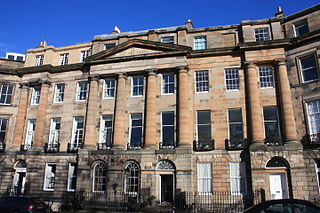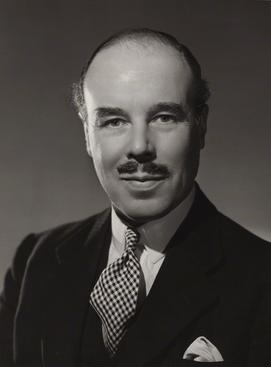
Edinburgh South is a constituency of the House of Commons of the UK Parliament created in 1885. The constituency has been held by Scottish Labour since 1987, being represented by Ian Murray since 2010. Murray was the only Labour MP in Scotland to retain his seat at the 2015 and 2019 general elections and this is one of only three seats never held by the Scottish National Party (SNP).
Berwick and Haddington was a constituency of the House of Commons of the Parliament of the United Kingdom from 1918, when it replaced the separate Berwickshire and Haddingtonshire constituencies, until it was renamed Berwick and East Lothian for the 1950 general election. It elected one Member of Parliament (MP), using the first-past-the-post voting system.

Aberdeen South is a burgh constituency of the House of Commons of the Parliament of the United Kingdom and it elects one Member of Parliament (MP) by the first-past-the-post system of election.

East Renfrewshire is a constituency of the House of Commons, to the south of Glasgow, Scotland. It elects one Member of Parliament (MP) using the first-past-the-post system of voting.

Edinburgh Central was a burgh constituency of the House of Commons of the Parliament of the United Kingdom from 1885 to 2005. It elected one Member of Parliament (MP) by the first past the post system of election.
Ross and Cromarty was a county constituency of the House of Commons of the UK Parliament from 1832 to 1983. It elected one Member of Parliament (MP) using the first-past-the-post voting system.
Dundee was a constituency of the House of Commons of the Parliament of the United Kingdom from 1832 to 1950, when it was split into Dundee East and Dundee West.
Glasgow Bridgeton was a parliamentary constituency in the city of Glasgow. From 1885 to 1974, it returned one Member of Parliament (MP) to the House of Commons of the Parliament of the United Kingdom, elected by the first-past-the-post voting system.
Glasgow Govan was a parliamentary constituency in the Govan district of Glasgow. It was represented in the House of Commons of the Parliament of the United Kingdom for 120 years; from 1885 until 2005, returning one Member of Parliament (MP) elected by the first-past-the-post system.

West Renfrewshire was a county constituency of the House of Commons of the Parliament of the United Kingdom from 1885 to 1983 and again from 1997 until 2005. In 2005 the constituency was abolished and the area is now represented by Inverclyde, Paisley and Renfrewshire North and Paisley and Renfrewshire South.
Aberdeen and Kincardine Central, also known as Central Aberdeenshire, was a county constituency of the House of Commons of the Parliament of the United Kingdom from 1918 until 1950. It elected one Member of Parliament (MP) by the first past the post system of election.
EastAberdeenshire was a Scottish county constituency of the House of Commons of the Parliament of the United Kingdom from 1868 to 1918 and from 1950 to 1983. It elected one Member of Parliament (MP) by the first past the post system of election.
Kincardineshire was a constituency of the House of Commons of the Parliament of Great Britain from 1708 to 1801 and of the Parliament of the United Kingdom from 1801 to 1918. It was represented by one Member of Parliament (MP).
Sir Arthur James Irvine, QC PC was a British barrister and politician. He was the Labour MP for Liverpool Edge Hill from the 1947 by-election until he died aged 69.

James Scott was a Scottish lawyer and Liberal Party politician.

Major Sir Murdoch McKenzie Wood OBE, DL was a Scottish Liberal politician.

Sir Colin Norman Thornton-Kemsley, was a Conservative and National Liberal politician in the United Kingdom. He was the Member of Parliament (MP) for Kincardine and Western Aberdeenshire from 1939 to 1950, and for North Angus and Mearns from 1950 until his retirement at the 1964 general election.
The 1905 Buteshire by-election was a by-election held on 3 March 1905 for the British House of Commons constituency of Buteshire.

William Stanley Russell Thomas was a physician, barrister and Welsh Liberal politician who served as a Liberal National Member of Parliament.
The 1943 Midlothian and Peebles Northern by-election was a parliamentary by-election held in Scotland on 11 February 1943 to elect a new Member of Parliament (MP) for the House of Commons constituency of Midlothian and Peebles Northern.









